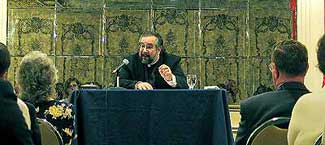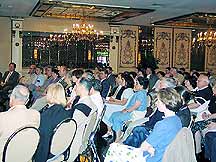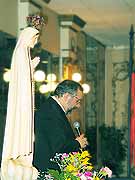
With the controversy over same-sex “marriage” boiling in Massachusetts and around the nation, many God-fearing Americans lose sight of the beauty and holiness of this endangered sacrament.
With this in mind, the American Society for the Defense of Tradition, Family and Property (TFP) sponsored a lecture by EWTN host Fr. John Trigilio titled “The Sanctity of Marriage,” on May 23 in Wilkes-Barre, Pennsylvania. Nearly 90 TFP members, supporters and friends came to hear Father Trigilio explain what marriage is and why it must be defended.
Before the lecture, TFP Speaker Norman Fulkerson introduced the TFP’s new hard-hitting book, Defending a Higher Law: Why We Must Resist Same-sex “Marriage and the Homosexual Movement, which was available for purchase at the event.
Marriage and Natural Law

Father Trigilio began his discourse explaining how marriage is founded upon natural law, which defines it. Thus, to try and fit any union other than that of one man and one woman into a marriage defies its essence.
“[To call anything other than the union of one man and one woman marriage] would be the same as if someone tried to tell you that two plus two was now going to equal five,” Father Trigilio said. “In science and mathematics, we would not tolerate someone not telling the truth, but when it comes to theology and morality we tend to be a little bit tolerant.”
A Permanent Covenant
Furthermore, Holy Mother Church teaches that marriage is a “permanent, faithful and, God willing, fruitful covenant between one man and one woman” which distinguishes it from a simple contract that is entered for the personal gain of those involved.
This idea of a permanent covenant explains why the Church is against pre-nuptial agreements. Father Trigilio explained: “[Marriage] is not a contract where we just sign on the dotted line…and then we divide the property even-steven…That is not how a covenant works.”
In the marriage covenant, those who enter agree to give themselves permanently to each other. That is why it is a living symbol of the relationship between Christ and His Church.
Father Trigilio described the extent of this covenant: “I always tell couples on the day of their wedding…when you say ‘I do,’ that is the last time that pronoun should come across your lips. There is no more I. After you say ‘I do,’ from that moment until the day you die, it is we…that is how the two become one flesh.”
A Sanctifying Relationship
Furthermore, because Christ elevated marriage to the level of a sacrament, it is an institution that “sanctifies the husband and the wife.”

Father Trigilio explained: “[The Sacrament of Marriage] became supernatural in the terms that it sanctifies the husband and the wife. You become holy through the Sacrament of Matrimony. You become sacred to God.”
Quoting from the encyclical Casti Connubii of Pius XI, Father described how marriage is a divinely instituted relationship. Thus, the recent Church document, Considerations Regarding Proposals to Give Legal Recognition to Unions Between Homosexual Persons, decreed that the Church could not change marriage, even if She wanted to do so.
Time to Take a Stand
With Catholic teaching on marriage laid out in such terms, the necessity of defending the sacrament becomes crystal clear. After all, if marriage is a divinely instituted covenant, to defend it is to defend the rights of God. Thus everyone has the obligation to do so.
Father Trigilio pointed this out: “Our personal responsibility [to defend Marriage] is that everyone does what he is capable of doing…How can the government represent us, if we do not express what we want? The other group is very vocal…where is the clamor of everyone saying, ‘we want what God ordained as marriage?'”
Father Trigilio mentioned many avenues open for people to express themselves to their elected representatives in defense of marriage. These include: letter-writing, email, phone-calling and fax.
These methods, united with prayer will gain God’s favor and through the intercession of Mary Most Holy will defeat the homosexual movement and restore marriage to its proper place.

